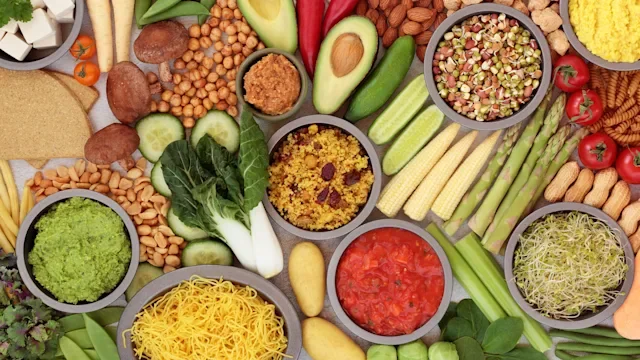Key takeaways:
There are many potential sources of inflammation in day-to-day life. Chronic inflammation can put you at risk for chronic health conditions like heart disease and diabetes.
Many foods that cause inflammation are items high in sugar, trans fats, and/or refined carbohydrates.
You don’t need to completely cut out all inflammatory foods from your diet. Making some swaps and small changes each day can make a big difference over time.
Inflammation is how your body responds to an injury, allergen, or infection. It’s why a sprained ankle doubles in size, and why you run a fever when your body is fighting a virus. But in today’s world, your body is constantly exposed to things that turn on your body’s inflammation response — even when it’s not needed. And in the U.S., many of the common foods in our diet are sources of inflammation.
It’s impossible to avoid inflammatory foods entirely. But eating inflammatory foods regularly can increase your risk of several conditions, including heart disease and diabetes. To protect your long-term health, it helps to know which foods are more likely to lead to an inflammation response.
Here are seven of the top foods that cause inflammation.
1. Refined grains
Refined grains go through a process that removes much of the fiber, vitamins, and minerals that would otherwise help make them anti-inflammatory.
Examples of foods that contain refined grains include:
White bread
White rice
Traditional pasta
Cereals
White flour
Refined grains contribute to inflammation in a couple of ways. First, since they are carbohydrates that break down quickly, they spike blood sugar levels. This blood sugar spike leads to an inflammatory response. Second, refined grains are a highly processed food (more on this in a minute), which is another way they can lead to inflammation.
2. Refined sugar
Eating foods that contain refined sugar is linked to diabetes and weight gain. In the U.S., sugary beverages are a major source of added sugar. It’s possible that refined sugars increase inflammation, while naturally occurring sugars, like those found in fruit and milk, don’t.
3. Sodium
Eating foods high in sodium (salt) affects your body in a number of ways. You may have heard that sodium increases blood pressure. But it can also increase inflammation. And high blood pressure and body-wide inflammation can both increase your risk for stroke, heart disease, and kidney disease.
Aging’s effect on immunity: As you age, your body-wide inflammation levels can increase. But there are ways to help lower inflammation through diet and lifestyle choices.
Does diet affect rheumatoid arthritis? Read about how one woman made dietary changes to help her manage rheumatoid arthritis flare-ups.
Easy ways to get more veggies every day: Yes, veggies are packed with nutrients. They also slow down your body’s insulin response. Here are some simple ways to add more vegetables to your diet.
The best foods for joint health: These anti-inflammatory foods can help reduce inflammation and pain in arthritic joints.
4. Red and processed meat
Red meat like beef and pork is high in saturated fat, which can raise your “bad” LDL (low-density lipoprotein) cholesterol. The evidence is mixed on whether it can cause inflammation.
But there’s more convincing evidence regarding processed red meats. Not only do they cause inflammation, but they’re usually high in salt, too. Examples of processed red meats include:
Jerky
Hot dogs
Cold cuts
Bacon
Read more like this
Explore these related articles, suggested for readers like you.
5. Trans fats
Trans fats are a type of fat used to make foods more shelf-stable. So they’re generally found in packaged foods. Trans fats are considered the most harmful type of fat for your health. They cause inflammation by raising LDL cholesterol without increasing “good” HDL (high-density lipoprotein) cholesterol that removes excess cholesterol from the blood. If you’re looking at food labels, try to avoid fats labeled “hydrogenated” or “partially hydrogenated.”
6. Ultra-processed foods
Eating ultra-processed foods can lead to inflammation because most contain added sugars, trans fats, and/or refined grains. Ultra-processed foods also contain preservatives and other additives that prolong shelf life but may contribute to chronic inflammation.
7. Alcoholic beverages
Researchers are learning more about the link between alcohol and chronic inflammation. We know that alcohol can lead to inflammation of the brain, gut, liver, and pancreas. The popular belief that alcohol is anti-inflammatory continues to be debunked by evidence of its negative effects on your body.
Common misconceptions about inflammatory foods
Many people consider common food allergens — like dairy and gluten — to be inflammatory. But even though some people have allergies or sensitivities to these foods, they aren’t necessarily inflammatory for everyone. Let’s take a look at some of these common misconceptions.
Does dairy cause inflammation?
Dairy foods, like cheese and milk, can cause an inflammatory response in people with milk allergies or lactose intolerance. But research hasn’t shown that dairy products cause inflammation in people who don’t have a dairy sensitivity.
Does gluten cause inflammation?
Most research seems to indicate that consuming gluten may lead to inflammation in people with a gluten sensitivity or certain health conditions, like celiac disease. But eating foods with gluten hasn’t been linked to inflammation in people who don’t have a sensitivity.
Gluten is found in many whole grains, which are rich in nutrients. But gluten is also found in refined carbohydrates and processed foods — such as white bread, bagels, tortillas, and pasta — which can be sources of inflammation.
Do eggs cause inflammation?
Eggs aren’t usually considered an inflammatory food. They do contain some substances — like omega-6 fatty acids — that have been linked to inflammation if consumed in excess. But eggs also contain other nutrients — like vitamin D — that can help lower inflammation.
One review of several studies looked at whether eggs increased inflammatory substances in the blood. Researchers didn’t find any evidence that eggs increased these markers of inflammation.
Does chicken cause inflammation?
Chicken isn’t considered an inflammatory food. One study looked at inflammatory markers in women with a body mass index (BMI) of over 30. It found that those who ate a diet high in chicken had lower markers of inflammation.
Chicken may also be better for you than other meats — like red or processed meat. That’s because it’s lower in saturated fat.
Does sunflower oil cause inflammation?
The research here is mixed.
On the one hand, sunflower oil contains omega-6 fats. Omega-6 fats provide multiple health benefits for your body. For example, they may reduce your risk of heart disease, stroke, and diabetes. But a few studies suggest that eating a lot of omega-6 fatty acids may increase inflammation in your body. Other research suggests that you can balance out this risk by eating more foods high in omega-3 fatty acids, like fish, beans, and avocados.
If you’re concerned, consider choosing oils with a higher omega-3 content, or those that have lots of monounsaturated fatty acids — such as olive oil or avocado oil.
Are there any anti-inflammatory diets?
Diets that consist of whole, unprocessed foods can help fight inflammation. Common anti-inflammatory nutrients include:
Omega-3 fatty acids, found in fatty fish, nuts, and plant oils
Antioxidants, found in leafy green vegetables and berries
Fiber, found in plant-based foods like whole grains, beans, and fruits
Spices like turmeric, ginger, and cinnamon
Below are some eating patterns that include anti-inflammatory foods.
Mediterranean diet
The Mediterranean diet is a way of eating that focuses on whole foods that contain healthy fats and proteins. It’s rich in:
Fruits
Vegetables
Legumes
Lean protein
Nuts
Whole grains
Olive oil
Dairy, fish, and red wine are also included in this diet, but they’re consumed in moderation. Red and processed meats are rarely consumed.
DASH diet
The DASH diet is short for Dietary Approaches to Stop Hypertension. It focuses on limiting salt, a common contributor to inflammation.
The DASH diet focuses on heart-healthy foods, such as:
Fruits
Vegetables
Fish
Whole grains
Nuts
Seeds
Lean protein
Nordic diet
The Nordic diet emphasizes foods that are common in Northern Europe. This means it’s rich in fruits, vegetables, and cold-water seafood. This diet is also low in common inflammatory foods like added sugar, processed meat, and alcohol.
Washoku diet
The Washoku diet comes from Japan. It encourages seasonal plant-based foods, including seaweed, soy, and green tea. It also incorporates fish. It’s low in sugar, animal proteins, and fats.
How do inflammatory foods affect the body in the long run?
It’s hard to avoid inflammatory foods all the time. And there’s no problem with eating packaged foods every now and then, or enjoying an occasional meal at your local diner. No single meal will lead to chronic inflammation — especially if you generally have a balanced diet and active lifestyle.
But a diet that consistently includes inflammatory foods can eventually harm your body’s cells and organs.
Chronic inflammation can contribute to:
Insulin resistance and diabetes
High blood pressure
High cholesterol
Heart disease
Crohn’s disease
Certain types of cancer
Parkinson’s disease
Simple dietary swaps to help lower chronic inflammation
Just as certain foods can increase inflammation in your body, other foods can help lower inflammation. And you don’t have to overhaul your diet. Small changes and swaps can make a difference. Here are five tips you can try.
1. Choose more nutritious whole grains
In place of refined grains like white rice or white pasta, try adding whole grains like:
Oatmeal
Brown rice
Whole-grain tortillas, bread, and pasta
Millet
Couscous
Farro
2. Lean into lean proteins
Look for opportunities to incorporate proteins that are less likely to be inflammatory, such as:
Ground turkey or lentils in place of ground beef
Eggs instead of traditional breakfast meats
Beans and legumes
Nuts and seeds
Cold-water fish, like salmon and trout
As you can see, lean doesn’t necessarily mean low-fat. For example, fish and nuts often have a higher fat content. But they contain nutritious, heart-healthy fats.
3. Have a cup of tea
Tea contains antioxidants and polyphenols that help reduce inflammation. In particular, unsweetened green tea is thought to help lower inflammation, boost immunity, and promote heart health.
4. Incorporate veggies where you can
Vegetables contain fiber, which helps decrease the body’s insulin response. This can help lower inflammation.
Look for opportunities to add veggies to your meal by:
Turning your meal into a salad: Taco salads are a fun and hearty option.
Choosing fiber-rich options instead of flour: Try swapping pasta and rice with zucchini noodles and cauliflower rice.
Adding vegetables to dishes like casseroles and quiches: Chop up some of your favorites and mix them in.
Eating vegetables with your favorite sauces and dips: When you eat hummus, use carrots, cucumbers, or bell pepper slices instead of crackers. Or try drizzling buffalo sauce on roasted cauliflower pieces.
5. Dish up desserts
Consider taking a smaller portion size of your favorite dessert and pairing it with fruit. That way, you get to enjoy your sweets while adding fiber and other nutrients to your diet. If you’re baking, try swapping out regular sugar for natural sweeteners like:
Coconut sugar
Dates
Bananas
Honey
Maple syrup
Frequently asked questions
Peanut butter isn’t an inflammatory food. In fact, research suggests it has anti-inflammatory properties. Peanut butter contains magnesium and vitamin E, both of which are anti-inflammatory nutrients.
Peanuts also contain linoleic acid, which is thought to be anti-inflammatory if consumed in moderation. You can try peanut butter with fruit or veggie slices, such as:
Carrots
Celery
Apples
Banana
Research suggests that coffee may have anti-inflammatory effects and help lower your risk for inflammatory health conditions. Coffee contains a variety of flavonoids and quercetin compounds that have beneficial antioxidant properties.
In addition to coffee, several drinks may lower inflammation in your body. One example is green tea. Green tea contains epigallocatechin gallate (EGCG), a compound with anti-inflammatory properties. Other examples are pomegranate juice and grape juice.
Diet isn’t the only area to focus on to decrease inflammation. It’s also important to manage stress, find a movement routine, and get adequate sleep to keep your inflammation levels low.
Peanut butter isn’t an inflammatory food. In fact, research suggests it has anti-inflammatory properties. Peanut butter contains magnesium and vitamin E, both of which are anti-inflammatory nutrients.
Peanuts also contain linoleic acid, which is thought to be anti-inflammatory if consumed in moderation. You can try peanut butter with fruit or veggie slices, such as:
Carrots
Celery
Apples
Banana
Research suggests that coffee may have anti-inflammatory effects and help lower your risk for inflammatory health conditions. Coffee contains a variety of flavonoids and quercetin compounds that have beneficial antioxidant properties.
In addition to coffee, several drinks may lower inflammation in your body. One example is green tea. Green tea contains epigallocatechin gallate (EGCG), a compound with anti-inflammatory properties. Other examples are pomegranate juice and grape juice.
Diet isn’t the only area to focus on to decrease inflammation. It’s also important to manage stress, find a movement routine, and get adequate sleep to keep your inflammation levels low.
The bottom line
Processed meat, added sugar, and refined grains are examples of inflammatory foods. When you eat these foods regularly, they can contribute to chronic inflammation. This can damage your body’s tissues and organs, and lead to health issues like heart disease and diabetes. Eating a variety of fruits, vegetables, plant-based proteins, and whole grains can help reduce your risk of inflammation and long-term health conditions.

Why trust our experts?



References
Afsar, B., et al. (2018). Salt intake and immunity. Hypertension.
Anand, S. K., et al. (2023). Detrimental effects of alcohol-induced inflammation on brain health: From neurogenesis to neurodegeneration. Cellular and Molecular Neurobiology.
Castaldo, L., et al. (2021). Antioxidant and anti-inflammatory activity of coffee brew evaluated after simulated gastrointestinal digestion. Nutrients.
Cenni, S., et al. (2023). The role of gluten in gastrointestinal disorders: A review. Nutrients.
Gioia, C., et al. (2020). Dietary habits and nutrition in rheumatoid arthritis: Can diet influence disease development and clinical manifestations? Nutrients.
Hess, J. M., et al. (2021). Exploring the links between diet and inflammation: Dairy foods as case studies. Advances in Nutrition.
Hezaveh, Z. S., et al. (2019). Effect of egg consumption on inflammatory markers: A systematic review and meta-analysis of randomized controlled clinical trials. Journal of the Science of Food and Agriculture.
Hussain, T., et al. (2016). Oxidative stress and inflammation: What polyphenols can do for us? Oxidative Medicine and Cellular Longevity.
Innes, J. K., et al. (2018). Omega-6 fatty acids and inflammation. Prostaglandins, Leukotrienes, and Essential Fatty Acids.
Kunnumakkara, A. B., et al. (2018). Chronic diseases, inflammation, and spices: How are they linked? Journal of Translational Medicine.
Lankinen, M., et al. (2019). Nordic diet and inflammation—a review of observational and intervention studies. Nutrients.
Lempesis, I. G., et al. (2023). Physiopathological mechanisms related to inflammation in obesity and type 2 diabetes mellitus. World Journal of Experimental Medicine.
Maki, K. C., et al. (2021). Saturated fats and cardiovascular health: Current evidence and controversies. Journal of Clinical Lipidology.
Ohishi, T., et al. (2016). Anti-inflammatory action of green tea. Anti-inflammatory and Anti-allergy Agents in Medicinal Chemistry.
O’Connor, L., et al. (2018). Intakes and sources of dietary sugars and their association with metabolic and inflammatory markers. Clinical Nutrition.
Patterson, E., et al. (2012). Health implications of high dietary omega-6 polyunsaturated fatty acids. Journal of Nutrition and Metabolism.
Rajaram, S., et al. (2023). Effect of nuts on markers of inflammation and oxidative stress: A narrative review. Nutrients.
Shiraseb, F., et al. (2022). Red, white, and processed meat consumption related to inflammatory and metabolic biomarkers among overweight and obese women. Frontiers in Nutrition.
Stromsnes, K., et al. (2021). Anti-inflammatory properties of diet: Role in healthy aging. Biomedicines.
Yatsuya, H., et al. (2021). What constitutes healthiness of Washoku or Japanese diet? European Journal of Clinical Nutrition.
















